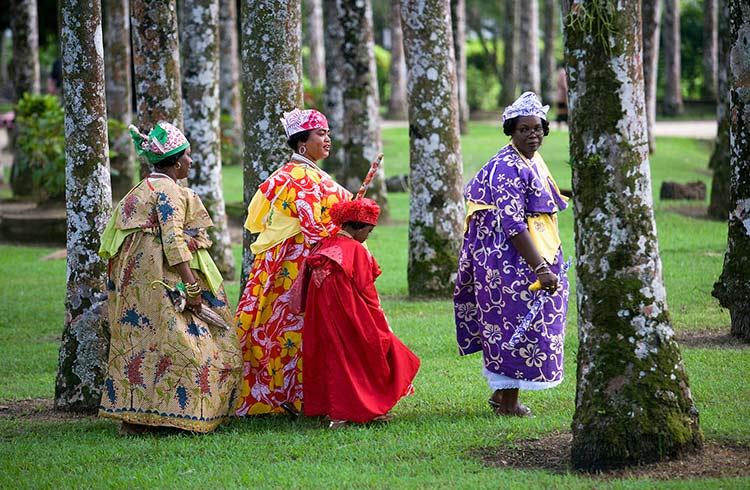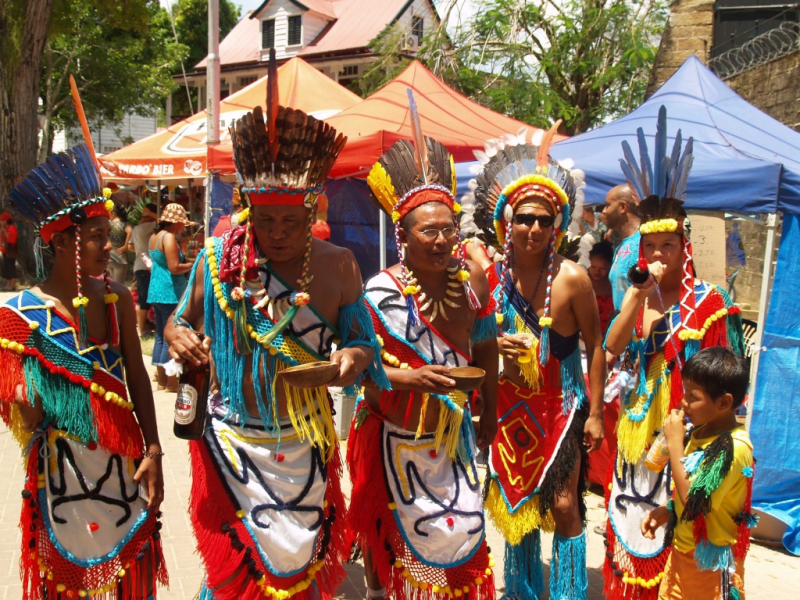Have you ever wondered about the local customs and etiquette in Suriname? Well, you’re in luck because in this article, we’ll provide you with a comprehensive guide that will help you navigate through the cultural norms of this beautiful country.
Suriname, located in South America, is known for its rich and diverse cultural heritage. With influences from various ethnic groups such as the Hindustani, Creole, Javanese, and Maroons, Suriname is a melting pot of traditions and customs. When visiting this unique country, it’s important to be aware of and respect these customs to ensure a pleasant and respectful experience.
One of the most important aspects of Surinamese etiquette is greetings. Surinamese people are generally warm and friendly, and it is customary to greet others with a handshake. However, when greeting someone of Indian descent, it is respectful to bring your hands together in a prayer-like gesture and say “Namaste”. Additionally, it is considered impolite to address someone by their first name upon meeting them for the first time. Instead, use their title and last name to show respect.
In Suriname, punctuality is not always highly valued. It is not uncommon for appointments or meetings to start late, so it’s always a good idea to be patient and flexible with time. When it comes to dining, it is customary to wait for the host to start eating before you begin. Eating with your hands is also acceptable, especially when enjoying traditional Surinamese dishes such as roti or bara. However, always remember to eat with your right hand as the left hand is considered unclean. These are just a few examples of Suriname’s unique customs and etiquette. By being aware and respectful of these cultural norms, you can enhance your experience and connect with the locals on a deeper level. So, keep on reading to learn more about the fascinating traditions of Suriname! Suriname, nestled on the northeastern coast of South America, is a country rich in cultural diversity. Its unique blend of African, Indian, Indigenous, and Dutch influences has shaped its customs and etiquette. As a traveler, it is important to respect and understand the local customs in order to have a memorable and meaningful experience. In this guide, we will explore the various aspects of Surinamese culture, including greetings and introductions, dress code, dining etiquette, communication, religious customs, gift-giving, social etiquette, business etiquette, public behavior, family customs, celebrations and festivals, gender roles, local taboos, and the importance of cultural sensitivity when traveling. Let’s dive in!

Greetings and Introductions
Traditional Greetings
When meeting someone in Suriname, it is customary to greet them with a warm smile and a handshake. Eye contact is important, as it signifies sincerity and respect. In more traditional communities, such as among the Maroons or Indigenous peoples, it is common to give a nod or a slight bow as a sign of greeting. It is also polite to ask about the person’s well-being or how their day is going.
Proper Introductions
When introducing yourself to someone in Suriname, it is polite to use your full name and address the other person by their title and last name. If you are unsure of someone’s title or name, it is acceptable to ask for clarification. In a formal setting, such as a business meeting, it is customary to greet the most senior person first.
Handshakes and Other Forms of Greeting
Handshakes are the most common form of greeting in Suriname, but some people may prefer other forms of greeting such as a hug or a kiss on the cheek. It is important to observe the other person’s body language and follow their lead. In more rural or traditional communities, it is common for women to offer a hand in greeting, while men may prefer a fist bump or a pat on the back. Adaptability and respect for cultural differences are key when it comes to greetings in Suriname.
Dress Code
Appropriate Attire for Different Occasions
The dress code in Suriname varies depending on the occasion. In formal settings, such as business meetings or religious ceremonies, it is expected to dress conservatively. Men should wear suits or dress shirts with ties, while women should opt for dresses or skirts that cover the knees and shoulders. Casual attire, such as jeans and t-shirts, is generally acceptable for everyday activities, but it is important to dress modestly and respectfully in public places.
Modesty in Clothing
Suriname is a predominantly conservative society, and it is important to dress modestly out of respect for the local customs and traditions. Revealing or provocative clothing should be avoided, especially in rural and traditional communities. Wearing shorts, sleeveless tops, or skimpy swimwear in public places may be seen as disrespectful or offensive.
Wearing Traditional Garments
Suriname is known for its vibrant and diverse cultural heritage, and wearing traditional garments is a wonderful way to experience and honor the local customs. When attending cultural events or festivals, you may see people dressed in traditional Maroon, Hindustani, Javanese, or Indigenous attire. If you have the opportunity, don’t hesitate to participate and wear traditional clothing yourself. It is a symbol of appreciation and respect for the local culture.

Dining Etiquette
Table Manners and Customs
Dining in Suriname is a time for socializing and connecting with others. When invited to someone’s home for a meal, it is customary to arrive on time or a few minutes late. Wait for the host to indicate where you should sit, and always offer to help with the preparation or cleaning up. When sitting at the table, wait for the host to begin eating before you start. It is considered impolite to reach across the table or talk with your mouth full. Remember to pace yourself and enjoy the meal, as dinner conversations often extend long after the plates are cleared.
Use of Utensils
In Suriname, most meals are eaten with utensils, such as forks and spoons. Knives are typically only used for cutting food. It is customary to hold the fork in the left hand and the spoon in the right hand. Sometimes, food may be eaten with the hands, especially when enjoying traditional dishes like roti or cassava bread. If unsure, observe the locals or ask for guidance.
Etiquette When Visiting Someone’s Home for a Meal
If you have the opportunity to be invited to a Surinamese home for a meal, it is a special and cherished experience. As a guest, it is polite to bring a gift for the host, such as flowers or a small token of appreciation. When entering the home, remove your shoes unless otherwise indicated. During the meal, try a little bit of everything and express your gratitude for the hospitality. It is customary to compliment the chef on the delicious food. Lastly, remember to thank your host for the wonderful meal and their hospitality before you leave.
Communication
Verbal and Non-Verbal Communication
Surinamese people value open and friendly communication. When conversing with locals, it is important to speak politely and maintain a positive tone. Non-verbal communication, such as hand gestures and facial expressions, is also important and often used to emphasize or convey meaning. It is advisable to avoid raising your voice or becoming aggressive, as conflict is generally frowned upon.
Importance of Politeness
Politeness is highly valued in Surinamese society. When interacting with others, be sure to use “please” and “thank you” as appropriate. Addressing someone with their title and last name, followed by “meneer” (sir) or “mevrouw” (madam), is a sign of respect. It is also customary to greet others with a smile, regardless of whether you know them personally or not.
Respecting Personal Space
Personal space is an important aspect of Surinamese culture. It is polite to maintain a comfortable distance while conversing with others. Touching or hugging someone without their consent may be seen as intrusive or inappropriate. Always be mindful of the other person’s personal boundaries and cultural norms.

Religious Customs
Respecting Religious Practices
Suriname is a religiously diverse country, with Christianity, Hinduism, Islam, and Indigenous spiritual beliefs being the most prominent religions. It is important to respect and be sensitive to the religious practices and beliefs of the Surinamese people. When visiting places of worship, such as churches, mosques, or Hindu temples, it is customary to dress modestly and remove your shoes before entering. It is also important to observe any rules or rituals that may be associated with the place of worship.
Attending Religious Ceremonies
If you have the opportunity to attend a religious ceremony in Suriname, it is a unique and enriching experience. It is polite to dress appropriately and be respectful of the customs and traditions. It is common to offer a small donation or gift during the ceremony. It is also important to listen to the instructions of the religious leaders or elders and follow their lead during the ceremony.
Behavior in Places of Worship
When visiting a place of worship, it is important to maintain a quiet and respectful demeanor. Avoid loud conversations, use of mobile phones, or disruptive behavior. If unsure about the appropriate behavior, observe and follow the lead of others. Remember to remove your shoes before entering and be mindful of any specific customs or rituals that may be followed.
Gift Giving
Appropriate Gifts for Different Occasions
Gift giving is a common practice in Suriname, particularly during special occasions and celebrations. When selecting a gift, it is important to consider the occasion and the relationship between you and the recipient. Common gifts include flowers, chocolates, or thoughtful tokens of appreciation. For more formal events or business meetings, it is advisable to bring a small gift that represents your home country or culture.
Gift-Giving Etiquette
When presenting a gift in Suriname, it is polite to use both hands and offer it to the recipient with a smile. Avoid giving gifts that are overly expensive or extravagant, as it may make the recipient uncomfortable. Gifts are typically opened in private, unless the giver specifically requests otherwise. Remember to express your gratitude if you receive a gift from someone.
Giving and Receiving Presents
When receiving a gift in Suriname, it is important to accept it graciously and show your appreciation. It is customary to open the gift in front of the giver and express your gratitude for their thoughtfulness. If you receive a gift that you cannot use or do not like, it is polite to accept it graciously and thank the giver. Avoid making negative remarks or showing disappointment, as it may be considered rude.

Social Etiquette
Respect for Elders
Respect for elders is deeply ingrained in Surinamese culture. It is important to address older individuals with the appropriate titles, such as “oom” (uncle) or “tante” (aunt), followed by their last name. When speaking to someone older or with more authority, it is customary to use the formal “u” instead of the informal “jij” when addressing them. Showing respect and deference towards older individuals is highly valued in Suriname.
Proper Behavior at Social Gatherings
Social gatherings are common in Surinamese culture and provide an opportunity for people to connect and enjoy each other’s company. It is important to arrive on time or a few minutes late, as being punctual is seen as respectful. When attending a social gathering, it is customary to bring a small gift or contribute to the event, such as by bringing a dish or a beverage. During the gathering, engage in polite conversation and be attentive to the needs of others.
Etiquette When Meeting New People
When meeting someone new in Suriname, it is customary to shake hands and introduce yourself with a smile. Take the time to exchange pleasantries and engage in small talk. It is important to be attentive, show genuine interest in the other person, and listen actively. Avoid interrupting or dominating the conversation. Building a personal connection is highly valued in Surinamese culture.
Business Etiquette
Formal vs. Informal Business Practices
Suriname has a hybrid business culture that blends formal and informal practices. In formal business settings, such as corporate offices or governmental institutions, it is important to dress appropriately in business attire and maintain a professional demeanor. However, in more informal business settings, such as small businesses or entrepreneurial ventures, a more relaxed and casual approach may be acceptable. It is advisable to gauge the business environment and adapt accordingly.
Etiquette During Meetings and Negotiations
When attending business meetings or negotiations in Suriname, it is important to arrive on time or a few minutes early. Punctuality is valued and tardiness may be considered disrespectful. During meetings, it is important to be attentive, take turns speaking, and listen actively. It is common to engage in small talk before getting down to business, as building personal connections is highly valued. It is important to be patient and flexible, as decisions may take longer to reach than in Western cultures.
Respecting Hierarchies
Surinamese society places a strong emphasis on hierarchies and respect for authority. In business settings, it is important to be aware of these hierarchies and address individuals with their appropriate titles. It is common for decisions to be made by senior individuals, and it is important to follow their lead and respect their authority. If you are in a position of authority, it is important to lead with humility and show respect for those under you.

Public Behavior
Respecting Public Spaces
Respecting public spaces is essential in Suriname. It is important to keep the environment clean by disposing of trash in designated bins and not littering. Avoid damaging public property, such as parks or historical sites. Respecting the natural surroundings and wildlife is also important. If visiting natural reserves or protected areas, follow the guidelines and regulations set forth by the authorities.
Proper Behavior in Public Transportation
Public transportation, such as buses and taxis, is a common mode of travel in Suriname. It is important to queue in an orderly fashion and wait for your turn when boarding. Offer your seat to pregnant women, elderly individuals, or people with disabilities. Be mindful of your belongings and keep them secure. Avoid engaging in loud conversations or disruptive behavior that may disturb other passengers.
Etiquette in Public Gatherings or Events
When attending public gatherings or events in Suriname, it is important to be respectful of others and follow any guidelines or rules set forth by the organizers. Avoid pushing or shoving in crowded areas and be mindful of personal space. It is important to engage in polite and respectful behavior, as well as maintain a positive and friendly attitude towards others.
Family Customs
Family Values and Traditions
Family plays a central role in Surinamese culture, and strong family values are upheld. It is important to show respect towards family members, especially older individuals and those in positions of authority. Surinamese families often gather for meals or special occasions, and it is common for extended family members to live together or within close proximity. Building and maintaining strong family bonds is highly valued in Surinamese society.
Respecting Family Structures
Surinamese families may have different structures, ranging from nuclear families to extended families and even multi-generational households. It is important to respect and acknowledge the family structure of the individuals you interact with. Addressing older individuals with their appropriate titles, showing deference towards authority figures, and engaging in respectful conversations are key aspects of respecting family structures in Suriname.
Etiquette When Visiting Someone’s Home
When visiting someone’s home in Suriname, it is important to be respectful and follow the customs and rules established by the host. Remove your shoes upon entering unless otherwise indicated. Offer to help with the preparations or cleaning up. Show appreciation for the hospitality by complimenting the host and expressing your gratitude before leaving. It is also customary to bring a small gift, such as flowers or a token of appreciation, for the host.
Celebrations and Festivals
Popular Festivals and Celebrations
Suriname is known for its vibrant festivals and celebrations, which provide a glimpse into the rich cultural tapestry of the country. Some of the most popular festivals include Holi Phagwa (Festival of Colors), Diwali (Festival of Lights), Christmas, and Keti Koti (Emancipation Day). These celebrations are marked by music, dance, traditional dress, and delicious food. If you have the opportunity to participate, it is an incredible experience that should not be missed.
Etiquette for Participating in Cultural Events
When attending cultural events or festivals in Suriname, it is important to be respectful and appreciative of the traditions and customs. Dress appropriately in traditional or festive attire, if possible. Observe and follow the lead of the locals when it comes to dancing or participating in cultural rituals. Be mindful of any guidelines or rules set forth by the organizers, and engage in conversations with the locals to learn more about the significance of the event.
Traditional Customs During Special Occasions
Special occasions, such as weddings, births, or religious ceremonies, are celebrated with great enthusiasm in Suriname. Traditional customs and rituals are often observed during these events. If you have the opportunity to attend, show respect for the customs and traditions by observing and participating in the activities. Be open to learning about the meanings behind these customs and ask questions to gain a deeper understanding.
Gender Roles
Respect for Gender Roles
Gender roles in Suriname are influenced by cultural traditions and beliefs. While there may be certain expectations and divisions of labor based on gender, Surinamese society is evolving and becoming more egalitarian. It is important to respect the norms and customs surrounding gender roles, but also recognize and appreciate the diversity of perspectives and experiences that exist within Surinamese society.
Interacting with People of Different Genders
When interacting with people of different genders in Suriname, it is important to treat everyone with respect and equality. Avoid making assumptions or stereotyping individuals based on their gender. Listen actively and be attentive to the needs and perspectives of others. It is important to foster an inclusive and supportive environment where everyone feels valued and respected.
Etiquette Towards Women and Men
Etiquette towards women and men in Suriname is based on politeness, respect, and equality. It is important to address individuals by their appropriate titles and show deference towards those in positions of authority, regardless of their gender. When engaging in conversations, be mindful of the other person’s perspective and avoid interrupting or dominating the conversation. Treat everyone with courtesy and respect, regardless of their gender.
Local Taboos
Avoiding Offensive Topics
Surinamese society is diverse, and it is important to be sensitive to different cultural, religious, and political perspectives. Avoid discussing sensitive topics, such as politics, religion, or ethnicity, unless invited to do so. Be aware of the potential impact of your words and actions, and strive to create a harmonious and inclusive environment wherever you go.
Respecting Cultural Sensitivities
Surinamese culture is steeped in traditions and beliefs, and it is important to respect and appreciate these cultural sensitivities. Be mindful of dress codes, religious practices, and customs when visiting sacred sites or participating in cultural events. Show curiosity and ask questions, but do so with respect and genuine interest.
Understanding Local Customs and Beliefs
To truly immerse yourself in Surinamese culture, take the time to understand the local customs and beliefs. Engage in conversations with the locals, participate in cultural events, and be open to learning about different perspectives. By being curious and respectful, you can forge meaningful connections and gain a deeper appreciation for the rich tapestry of Surinamese society.
Conclusion
Suriname, with its diverse cultural heritage, offers a wealth of customs and etiquette for travelers to explore. From greetings and dress code to dining etiquette and religious customs, there are numerous aspects to respect and appreciate. By being culturally sensitive and open-minded, you can engage in meaningful interactions, foster positive relationships, and create lasting memories. Remember, the key to a successful and enjoyable trip to Suriname lies in embracing and respecting the local customs and traditions. So go forth, immerse yourself in the vibrant culture, and have an unforgettable journey!